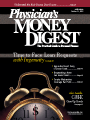Publication
Article
Physician's Money Digest
Consider the State of Retirement Today
Author(s):
PhysiciansPractice
Three years ago, at age 59, Dr.Dewey Ervin, a Florida-basedorthopedic surgeon, decidedthat it was time to enter a newphase in his life and retire from hismedical career. With his retirementportfolio well stocked, Dr. Ervin madehis departure. Just 18 months later,according to an article in (www.physicianspractice.com),he faced the daunting possibility of havingto return to work on a part-timebasis because the stock market erodedmuch of his retirement savings.
AMNews
Dr. Roland Molinet, a Fort Lauderdaleinternist, successfully built a sizeableretirement portfolio with the helpof the technology stock craze in the1990s. Unlike other unlucky investorswho lost their savings when the sectoreventually imploded, Dr. Molinet managedto hold on to his earnings. Withenough money set aside for retirement,he looked forward to the distant future.Now, according to an article in (www.ama-assn.org), his plans arechanging. At age 69, having seen thevalue of his IRA reduced by more than50% over the past 2 years, he is planningto practice into his 70s.
Common Retirement Woes
If these disheartening scenarios seemfamiliar, it's not surprising. Physiciansare part of a growing segment of thepopulation that has been forced back towork due to the reduced value of retirementsavings. A December 2002 AARPsurvey found that 77% of stock-ownersage 50 to 70 have lost money in the marketduring its recent downturn. Of thosesurveyed, 25% report having lost asmuch as half of their investment savings,while another 9% indicate they lostmore than half.
PhysiciansPractice
Part of the problem, notes the article, is that physicianswere guilty of the same investingerrors made by many other individualinvestors. They saw double-digit annualyields and flocked to growth-orientedmutual funds and other risky stockofferings. Oftentimes, these physician-investorswere unaware of what theywere holding in their retirement portfolios.Not knowing what they held intheir portfolios left them extremely vulnerableto the sharp drop in market valuesthat began in mid-2000.
Successful Adjustments
AMNews
Physicians are tackling the problemof a reduced retirement fund in differentways. Dr. Molinet, who never gotthe chance to retire, continues to practicemedicine. He told that hereceived good advice to diversify hisinvestments; unfortunately, he didn'tlisten. Even when the market declinedin 2001, he didn't expect things to getas bad as they eventually did. Ofcourse, hindsight is always 20/20.
Dr. Ervin has had to reacquaint himselfwith a work routine after an 18-month hiatus. Realizing that the moneyhe set aside for retirement wouldn't lastas long as he anticipated, Dr. Ervinapproached his former practice with theidea of returning on a part-time basis.For years, the practice had been lookingto recruit a nonsurgical orthopedist whocould provide triage and nonoperativecare, but that type of provider is difficultto find. For Dr. Ervin and his formerpractice, it was a match made in heaven.
Dr. Ervin practices medicine at least2 1/2 days a week. His compensation isbased on the number of patients he sees.The income he receives from the practiceis sufficient to support him and his wife,enabling him to avoid drawing on hisretirement savings. Fortunately, Dr.Ervin says he has actually enjoyedreturning to work. Coming out of retirementhas allowed him to reestablish contactwith old patients and colleagues.
Professional Advice
Other physicians have becomeaccustomed to the retired lifestyle andare not willing to return to practice. Asa result, they're making considerablelifestyle concessions. Adjusting yourlifestyle (eg, spending less and savingmore), financial professionals say, isthe first step to surviving a reducedretirement portfolio. One physicianwho has applied this economic strategyis John Wickenden, MD.
AMNews
Dr. Wickenden, an orthopedic surgeon,has been retired for 2 1/2 yearsand says he has cut back significantlyon his travel to keep his retirementnest egg intact. He told thathe has lost an estimated 15% to 20%of his $2-million net worth, and nowlives on approximately $80,000 a year.Despite his losses, Dr. Wickendendoesn't consider working again anoption. "I can't imagine going back towork for anything," he says. "If I hadto, I could live on $30,000 a year—butI hope I won't have to."
Words of wisdom:
Financial professionals advise factoringin inflation when consideringhow much you'll need for retirement,and projecting that you could live wellinto your 90s. They suggest takingadvantage of changes in the tax codeand contributing as much as you canto your retirement plan, especially if itis a tax-deferred plan. Remember that you don't haveto follow the crowd. Instead, develop asound asset allocation strategy thatmatches your risk tolerance.
Lastly, provide a little cushion foryour nest egg by creating an emergencyaccount that can cover up to 6 months'worth of expenses. Not only will thisprovide you with peace of mind, it willprevent you from using your retirementsavings.
